#breakup of yugoslavia
Text
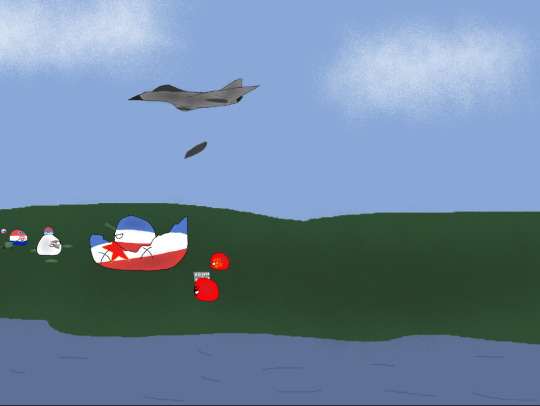
Yugoslav wars...
0 notes
Link
Any Russian invasion of Ukraine was long expected to play out as a kind of postmodern war, defined by 21st-century weapons like media manipulation, battlefield-clouding disinformation, cyberattacks, false flag operations and unmarked fighters.
Such elements have featured in this war. But it is traditional 20th-century dynamics that have instead dominated: shifting battle lines of tanks and troops; urban assaults; struggles over air supremacy and over supply lines; and mass mobilization of troops and of weapons production.
The war’s contours, now nearly a year into the fighting, resemble not so much those of any future war but rather those of a certain sort of conflict from decades past: namely, wars fought between nations in which one does not outright conquer the other.
Such conflicts have grown rarer in the period since 1945, an era often associated more with civil wars, insurgencies and American invasions that have quickly shifted to occupation.
But wars between nations have continued: between Israel and Arab states, Iran and Iraq, Armenia and Azerbaijan, India and Pakistan, Ethiopia and Eritrea. These are the conflicts that military historians and analysts, when asked to draw parallels with the Russian war in Ukraine, tend to cite.
“You have these big commonalities. In Korea, for example,” Sergey Radchenko, a Johns Hopkins University historian, said, referring to the Korean War. “Big conventional battles. Bombardment of infrastructure.”
Every war is unique. But certain trends that have played out across this subset of conflicts, including in Ukraine, may help to shed light on what drives week-to-week fighting, what tends to determine victory or failure and how such wars typically end — or don’t.
One after another, Dr. Radchenko said, such wars have started over fundamental territorial disputes that date back to the warring countries’ founding and are therefore baked into both sides’ very conception of their national identities. This makes the underlying conflict so difficult to resolve that fighting often recurs repeatedly over many decades.
Those wars have often turned, perhaps more than any other factor, on industrial attrition, as each side strains to maintain the flow of matériel like tanks and antiaircraft munitions that keep it in the fight.
But this works very differently from the competition over raw manpower that defined conflicts like World War I, touching more on matters of technology, economic capacity and international diplomacy.
#current events#history#military history#warfare#philosophy of war#russo-ukrainian war#2022 russian invasion of ukraine#korean war#iran-iraq war#breakup of yugoslavia#yom kippur war#ukraine#russia#carl von clausewitz
0 notes
Text
Another poll about knowledge. Reblog and feel free to say how you know what you know, if you have any historical connections to the region.
#history#sort of (it happened in the 90s)#Yugoslavia#i know all the countries it is now#and consider myself somewhat knowledgeable about the process of the breakup#and I know what I know because of a podcast about nationalism#which triggered a category four autism moment
7 notes
·
View notes
Text
Can't explain how much I'm seething over youtube slowly turning off comments on all music uploads. Reading insane beautiful crazy heartwarming sad stories shared by some boomer in arizona and a 15 year old from russia because they were moved by some random song someone made 40 years ago was so important and now we're slowly losing the purest form of human interaction so youtube shorts of tiktok reuploads can be monetized
4 notes
·
View notes
Text
I think Đorđe Martinović deserves to be upheld in tumblr's historical hall of fame alongside the likes of Ea-nasir and Tarrare
#for context he was a serbian farmer who inserted a bottle in his ass#and when it broke made up a story about being attacked by albanians to explain himself at the hospital#which in turn caused an unprecedented wave of serbian nationalism and anti-albanian sentiment#that heavily contributed to the breakup of yugoslavia#triple d.txt#okay to reblog
8 notes
·
View notes
Text
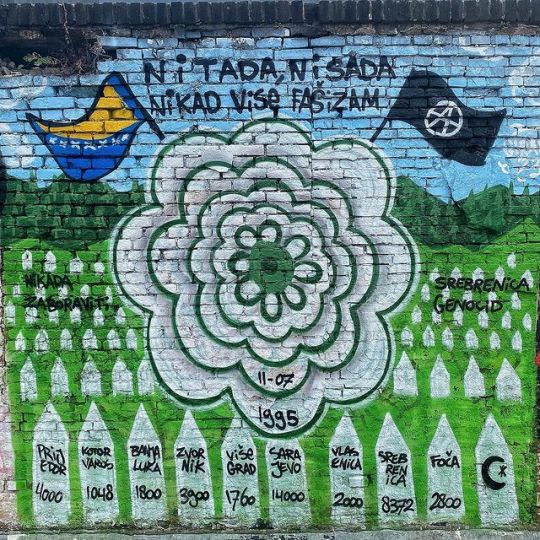
"Not then, not now, never again fascism
Never forget Srebrenica genocide"
Mural in Amsterdam of Potočari cemetery featuring the names of different Bosnian towns and cities with the corresponding estimated amount of victims.
Almost 30 years has passed since Europe was shaken by the genocide of more than 8000 muslim boys and men in the Bosnian city of Srebrenica, at the hands of Bosnian Serb troops during an operation of ethnic cleansing, witnessed by UN peacekeeping troops who failed resoundingly in their protection mission.
In the midst of the conflict in the Balkans during the 1990’s, the small city of Srebrenica, in Eastern Bosnia, was established as a “safe area” by the UN for civilians fleeing fights between Bosnian government and separatist Serb forces, during the breakup of Yugoslavia.
On 11 July 1995, Serb forces attacked Srebrenica lead by Bosnian Serb General Ratko Mladić, conducting a ten-day operation to take over Srebrenica and subject it to ethnic cleansing. More than 8000 people were killed, mainly Bosnian muslim boys and men.
235 notes
·
View notes
Photo
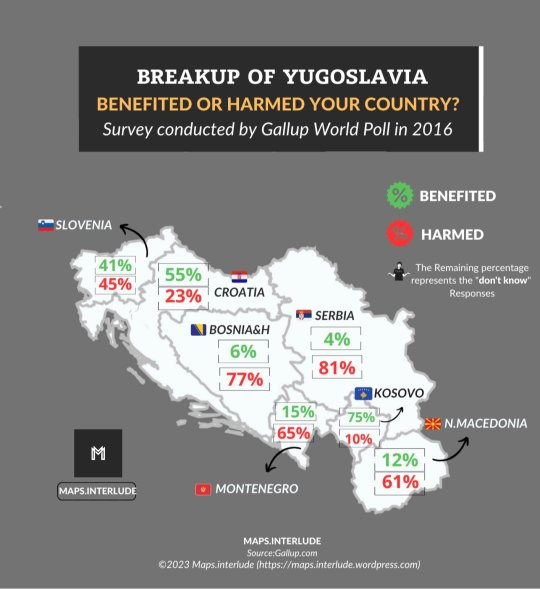
Breakup of Yugoslavia: “Benefited or Harmed your country?” [Survey]
by Maps_interlude
174 notes
·
View notes
Text
Things I Hope Happen in this 23/24 Season
> Arsenal gets relegated
> West Ham fans return to their hooligan roots and start trampling folk in Turin again
> Erling Haaland is arrested for the murder of Roy Keane
> A reunifed Yugoslavia wins the 2024 Euro
> Paul Pogba is tried at The Hague
> Jamie Carragher and Gary Neville are married in a tasteful ceremony outside of Wembley
> Jürgen Klopp tears Pep Guardiola's bald Catalán head clean off his shoulders after Liverpool beats City 27-0
> Kylian Mbappe disappears entirely and goes completely off-grid instead of accepting a concrete offer from Real Madrid, Al-Hilal, or Paris Saint-Germain. He is never seen or heard from again
> Darwin Nuñez wins the Golden Boot
> Arda Güler and Jude Bellingham absolutely rot on the Real Madrid bench
> Marco Reus lights himself on fire after losing the Bundesliga to Bayern Munich by 0.5 points
> Federico Valverde transfers to Liverpool after a messy breakup with Ancelotti, cites reasons for leaving as 'being replaced with children'
> Harry Maguire has the best season of his career and brings Manchester United the Treble, then leaves for City in the Summer Transfer Window
> Harry Kane has a violent nervous breakdown on the pitch after Richarlison scores and strips just for the goal to be ruled offside once again
> Manchester City are found guility of 102,719,273,929,280 counts of violating Premier League Financial Fair Play and are relegated to Iceland's 4th Division
#football#football memes#premier league#arsenal#west ham#euro 2024#jurgen klopp#pep guardiola#kylian mbappe#darwin nunez#darwin nuñez#arda guler#arda güler#jude bellingham#marco reus#real madrid#liverpool#harry kane#harry maguire#manchester city#manchester united#man city#jamie carragher#gary neville#roy keane#erling haaland
181 notes
·
View notes
Text
SET TWO - ROUND ONE - MATCH SIX

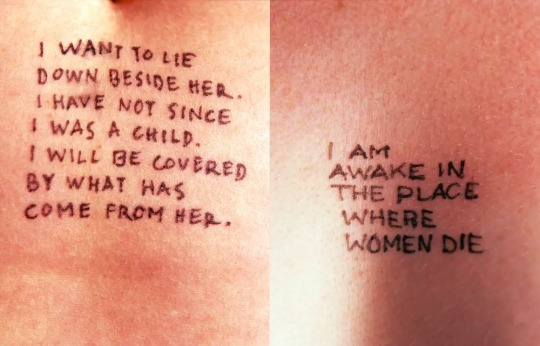
“Sharecropper” (1952 - Elizabeth Catlett) / “Lustmord” (1993 - Jenny Holzer)
SHARECROPPER: [no additional commentary provided]
LUSTMORD: I'm submitting lustmord by jenny holzer! It's an art piece about rape during war, written as a response to the crimes against women during the breakup of Yugoslavia. There's three different mediums: public projection, ink on skin, and engravings on silver bands wrapped around human bones. Each piece was made by taking three poems that Jenny Holzer wrote about rape (one from the perspective of the rapist, one from the victim, and one from a witness), and then displaying a line from each, so that the viewer doesn't know who's point of view it's from. Seeing the tattoos specifically (since that's what I saw first and what I'm most able to speak on), it fucks you up by asking you to consider what emotions are "appropriate" for each role to express. Is the rapist "allowed" to feel safety? Can the victim express cruelty? Can the witness feel scared? I've never seen the bones in person but I imagine they serve to emphasize the role that death plays in a lustmord, which is a german word describing a combined rape-murder. (electricmimikyu)
("Sharecropper" is a color linocut on cream Japanese paper print done by African-American artist Elizabeth Catlett. It measures 17 5/8 x 16 15/16" (44.8 x 43 cm) and is owned by the Art Institute of Chicago in Chicago.
"Lustmord" is part of a set taking its name from the German word for "sex murder", but this one is ink on skin tattoo by American artist Jenny Holzer.)
#art that fucks you up tournament#polls#atfyu polls#cw sa implied#cw rape#id in alt text#as usual please be particularly respectful in the tags!!
91 notes
·
View notes
Text
I really don’t get it when people say the Palestine/Israel conflict is complicated. Like I’m genuinely baffled?? The breakup of Yugoslavia was far more complicated but at the end of the day we were still able to acknowledge that ethnic cleansing is evil. People are just being willfully obtuse.
25 notes
·
View notes
Note
what are your thoughts on the US' participation in the breakup of yugoslavia?
I tend to give it a big "shrug" with a dose of "yeah probably helped". Overall outsiders were not going to stop that; Yugoslavia was a very quick collapse in a state that was very opaque to outsiders, so it was a confusing mess no outside intervention was going to cleverly fix. Earlier interventions would have been warranted, but its understandable that caution was taken and attempts moved slowly, from arms sales bans to no-fly zones to more decisive operations. At the end of the day in Bosnia NATO operations were very helpful in ceasing operations by the Serbian Army, who absolutely were 'the bad guys' (for the purposes of this conversation, that is obviously a silly phrase in most contexts) and an independent Bosnia was the better outcome which NATO helped achieve.
I am a bit heterodox on the Kosovo operation - I view that as more of a "both sides" situation where Kosovar insurgents were committing mass crimes against Serbs as well, and the US 'siding' with Kosovo as opposed to pushing for mutual peace has more to do with domestic US politics than a clear-eyed view of the situation. But at the end of the day Serbia was the one inflicting more death, a short war was better than a long war, and I do think the US intervention made the war shorter. So not as good as the Bosnia intervention, but not a bad decision.
Serbia actually keeps the Yugoslavian General Staff Headquarters that NATO bombed during the Kosovo War in its ruined state as a sort of monument to the war, right in the center of Belgrade. I got to visit it during my last trip there ~5 years ago or so, it was very cool - real Fuck You energy.
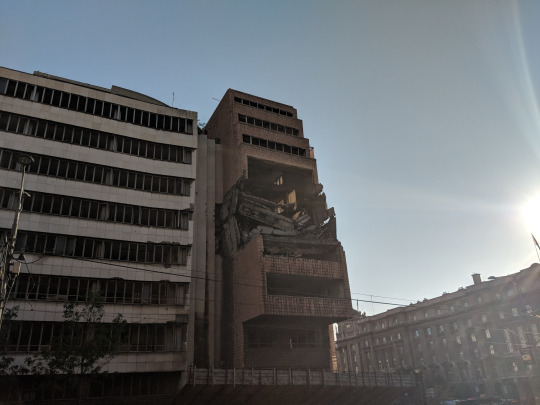
Obviously I need to make a tier list of wars by how ~Good~ they are at some point, don't I.
44 notes
·
View notes
Text
"Today’s diplomatic complicity in the catastrophic human rights and humanitarian crisis in Gaza is the culmination of years of erosion of the international rule of law and global human rights system. Such disintegration began in earnest after 9/11, when the United States embarked on its “war on terror,” a campaign that normalized the idea that everything is permissible in the pursuit of “terrorists.” To prosecute its war in Gaza, Israel borrows ethos, strategy, and tactics from that framework, doing so with the support of the United States.
It is as if the grave moral lessons of the Holocaust, of World War II, have been all but forgotten, and with them, the very core of the decades-old “Never Again” principle: its absolute universality, the notion that it protects us all or none of us. This disintegration, so apparent in the destruction of Gaza and the West’s response to it, signals the end of the rules-based order and the start of a new era.
...
A critic of this system might argue that states have only ever paid lip service to universality. The twentieth century abounds with examples of failures to uphold the equal dignity of all: the violence used against those advocating for decolonization, the Vietnam War, the genocides in Cambodia and Rwanda, the wars that followed the breakup of Yugoslavia, and many more. These events all testify to an international system rooted more in systemic inequality and discrimination than in universality. With good reason, one could contend that universality was never applied to Palestinians, who, as the Palestinian American scholar Edward Said expressed it, have been, instead, since 1948, “the victims of the victims, the refugees of the refugees.”
...
Within days of the ICJ ruling and its calls for provisional measures to prevent genocide in Gaza, the United States and a number of other Western governments canceled funding to the UN Relief and Works Agency, which provides a lifeline to people in Gaza. That decision does not just ignore the evident risks of genocide; it serves to amplify and accelerate them. The United States’ superpower status and its influence over Israel means Washington is uniquely positioned to change the reality on the ground in Gaza. More than any other country, the United States can prevent its close ally from continuing to commit atrocities. But thus far, it has chosen not to.
This pattern of conduct comes at a huge cost. As one G-7 diplomat has put it, “We have definitely lost the battle in the Global South. All the work we have done with the Global South (over Ukraine) has been lost. ... Forget about rules, forget about world order. They won’t ever listen to us again.”
5 notes
·
View notes
Note
heeey if communism is so awesome why did my country (serbia) overthrow its communist regime ahaha *twirls hair*
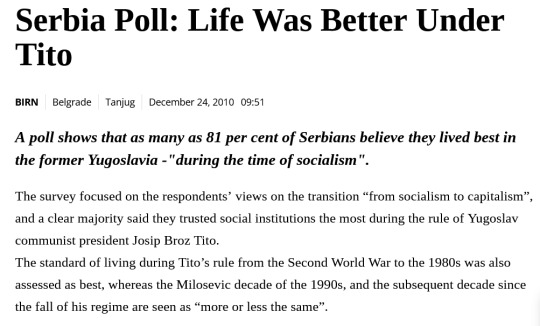
oh yeah how'd that work out for you
(also i believe what you meant to say was "why did Slobadan Milošević initiate the breakup of Yugoslavia and transition away from communism in his so-called anti-bureaucratic revolution." i suspect you're trying to pretend that Serbia was communist under Slobadan, but you know that's not true- certainly not by the time he was overthrown.)
162 notes
·
View notes
Text
whenever someone says milošević-apologist genocide denial bullshit about the breakup of yugoslavia i get so fucking mad. they could have said it ten seconds ago or ten years ago. i get equally irate. i will kick michael parenti’s ass in the desert.
“But NATO-“
NATO wasn’t the one who started the wars and NATO wasn’t the one who lay siege to Sarajevo and NATO wasn’t the one who filled mass graves with civilians. NATO wasn’t the one who committed genocide. You have to have some fucking proportionality in your analysis of these things.
Maybe one day we will see brotherhood and unity again.
Smrt fašizmu, sloboda narodu.
9 notes
·
View notes
Text


Because of the dissolution of the Soviet Union and the breakup of Yugoslavia, many countries competed at Barcelona 1992 for the first time in years. Estonia, Latvia, and Lithuania returned to the Games after over a half-century, and Croatia, Slovenia, and Bosnia and Herzegovina made their Olympic debut. Also debuting at these Games was the famous "Dream Team", the US men's basketball team that consisted of several famous NBA players. 1992 was the first year that NBA players were allowed to compete in the Olympics.
Vancouver 2010 is considered to have been one of the more successful Olympics in recent memory, breaking attendance records and having record global television coverage. At these Games, Canada won their first gold medal as host nation (after failing to do so in 1976 or 1988), and in fact, broke the record for the most gold medals won by a country at a single Winter Olympics. The venues constructed for the Games were also specifically designed with post-Olympics use in mind, to avoid wasteful construction.
10 notes
·
View notes
Note
What makes calling the various upheavals around certain parts of the world often collectively called colour revolutions color revolutions, such a sure way to spot someone who has no real knowledge on these events and why specifically russian disinformation? Were they the ones coining the term or is it their preferred line of tactics? I think I heard regular newspeople using it now and I thought it referred to revolutions fostered by the two sides in the cold war and I suppose since too.
The term color revolution specifically applies to revolutions in states like Georgia, Ukraine, and Kyrgyzstan, along with Serbia which was the most pro-Russian of the territories following the breakup of Yugoslavia. They were characterized by anti-authoritarian and pro-democracy sentiment against fraudulent and rigged elections and a push toward anticorruption. So while there were other democratic protests in other regions, "color revolution" specifically refers to these movements. The Hong Kong protests were very similar, but it was not an official color revolution. The term has been more broadly applied to any anti-Russia or anti-China protest, particularly pro-US or pro-European, but that's largely a term of convenience and almost exclusively used by disinformation peddlers and parrots.
Russia was primarily opposed to this because the regional autocrats in charge of these territories tended to be pro-Russian and increasingly looked to integrate their territories with Russia economically and militarily, allowing Russia to maintain a bit of its colonial pull that it enjoyed as the Soviet Union. So they promoted the idea that these revolutions were not organic and were exclusively funded by foreign influence operations largely as a means to preserve their own regional influence and prevent former puppet states from drifting westward. And some foreign influence definitely was the case, many of these regional autocrats saw foreign aid dwindle and be re-routed to NGO's that supported the opposition. But this largely falls to a fallacy that the dictators were owed foreign aid in the first place, and neglects the organic dissatisfaction that a lot of people in those countries felt. These countries suffered under corrupt regimes, with high levels of unemployment, official repression, and poverty. That *always* drive pushes toward opposition. Given the Revolutions of 1989 (which pro-Russians, tankies, and campists also largely describe without evidence as inauthentic), and the later Arab Spring, this appears to be a natural reaction to communications technology making organization easier and information more accessible.
By calling them "CIA-backed," disinformation actors were attempting to link them to CIA-funded, backed, or led coups that were a significant part of US foreign policy and truly did happen, particularly in Central and South America. But these accusations again lack evidence, there aren't any case officers named or operational plans found. It's largely an excuse fabricated out of whole cloth to describe an undesirable outcome, just like any other claim of voting irregularities when someone loses an election.
Thanks for the question, Santa.
SomethingLikeALawyer, Hand of the King
14 notes
·
View notes